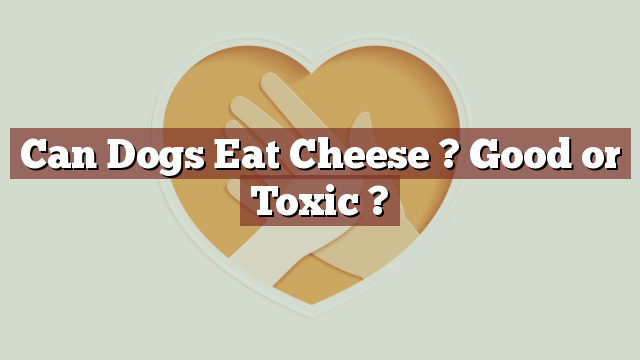Can Dogs Eat Cheese? Good or Toxic?
As responsible pet owners, it is crucial to familiarize ourselves with the foods that are safe for our furry companions. While dogs have specific dietary needs, it is natural to wonder if they can enjoy some of our favorite human foods, such as cheese. In this article, we will explore the nutritional value of cheese for dogs, its safety, potential risks and benefits, and what to do if your dog happens to indulge in this dairy delight.
Nutritional Value of Cheese for Dogs
Cheese is a beloved food enjoyed by many, thanks to its rich and savory taste. It is a dairy product that is packed with essential nutrients, including protein, calcium, vitamins A and B12, and phosphorus. These nutrients play a vital role in maintaining your dog’s overall health. Protein aids in muscle development and repair, while calcium and phosphorus contribute to strong bones and teeth.
Is Cheese Safe or Toxic for Dogs?
Can dogs eat cheese? The answer is yes, but with some considerations. In moderation, cheese can be safe for dogs to consume. However, it is important to note that not all dogs can tolerate dairy products, as they may be lactose intolerant. Lactose intolerance in dogs can lead to digestive issues such as diarrhea, gas, and bloating. Additionally, some dogs may have allergies to certain types of cheese or dairy products.
Veterinarians suggest introducing cheese gradually into your dog’s diet to gauge their tolerance and any potential adverse reactions. It is also essential to choose cheese varieties that are lower in fat and sodium, as excessive amounts of these can be harmful to dogs.
Potential Risks and Benefits of Dogs Eating Cheese
While cheese can provide some nutritional benefits to dogs, it is important to be aware of the potential risks. The high-fat content in cheese can contribute to obesity, pancreatitis, and other digestive issues in dogs. Additionally, some cheese varieties may contain ingredients such as onions or garlic, which are toxic to dogs and should be avoided.
On the other hand, cheese can be a valuable source of protein and calcium for dogs. It can serve as a tasty and nutritious treat when given in moderation. Some dog owners also use cheese as a training aid due to its strong flavor and smell, making it an effective reward during training sessions.
What to Do if Your Dog Eats Cheese
If your dog happens to gobble up a piece of cheese, there are a few steps you can take depending on the circumstances. If your dog is lactose intolerant or has had a negative reaction to cheese in the past, monitor them closely for any signs of digestive distress. Contact your veterinarian if symptoms persist or worsen.
If the cheese consumed contained toxic ingredients such as onions or garlic, it is essential to seek immediate veterinary assistance. These ingredients can be highly harmful to dogs and may require medical intervention.
Conclusion: Can Dogs Eat Cheese?
In conclusion, dogs can eat cheese in moderation. It can be a good source of protein and calcium, but it is important to choose low-fat and low-sodium varieties. Some dogs may be lactose intolerant or allergic to certain types of cheese, so it is crucial to observe their reactions when introducing cheese into their diet. If you have any concerns or questions, it is always best to consult with your veterinarian to ensure the safety and well-being of your furry friend.
Thank you for investing your time in exploring [page_title] on Can-Eat.org. Our goal is to provide readers like you with thorough and reliable information about various dietary topics. Each article, including [page_title], stems from diligent research and a passion for understanding the nuances of our food choices. We believe that knowledge is a vital step towards making informed and healthy decisions. However, while "[page_title]" sheds light on its specific topic, it's crucial to remember that everyone's body reacts differently to foods and dietary changes. What might be beneficial for one person could have different effects on another. Before you consider integrating suggestions or insights from "[page_title]" into your diet, it's always wise to consult with a nutritionist or healthcare professional. Their specialized knowledge ensures that you're making choices best suited to your individual health needs. As you navigate [page_title], be mindful of potential allergies, intolerances, or unique dietary requirements you may have. No singular article can capture the vast diversity of human health, and individualized guidance is invaluable. The content provided in [page_title] serves as a general guide. It is not, by any means, a substitute for personalized medical or nutritional advice. Your health should always be the top priority, and professional guidance is the best path forward. In your journey towards a balanced and nutritious lifestyle, we hope that [page_title] serves as a helpful stepping stone. Remember, informed decisions lead to healthier outcomes. Thank you for trusting Can-Eat.org. Continue exploring, learning, and prioritizing your health. Cheers to a well-informed and healthier future!

